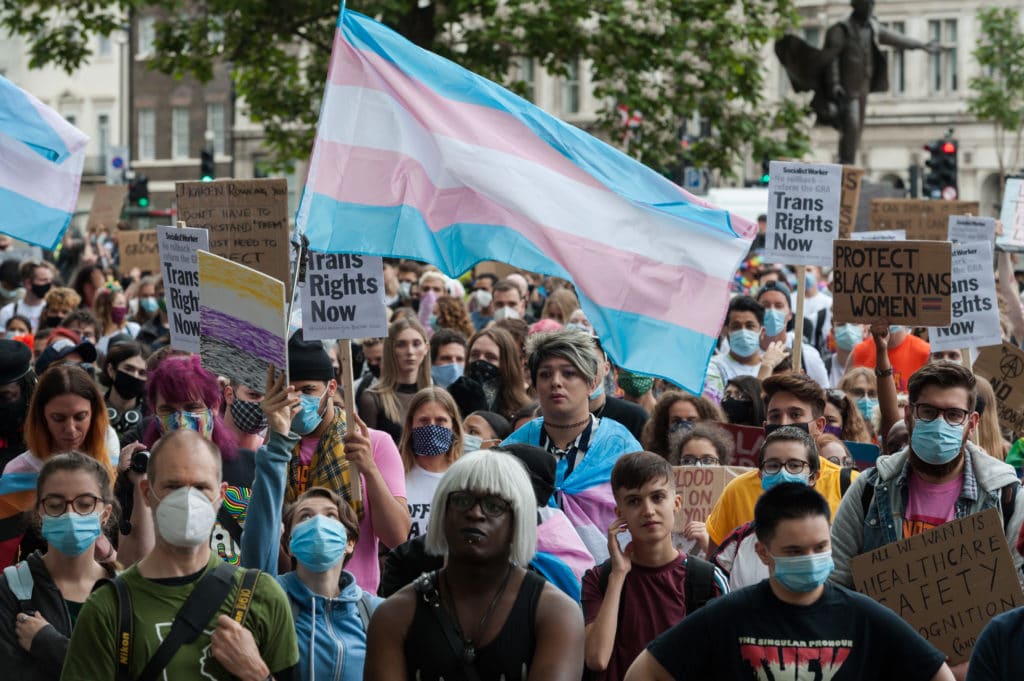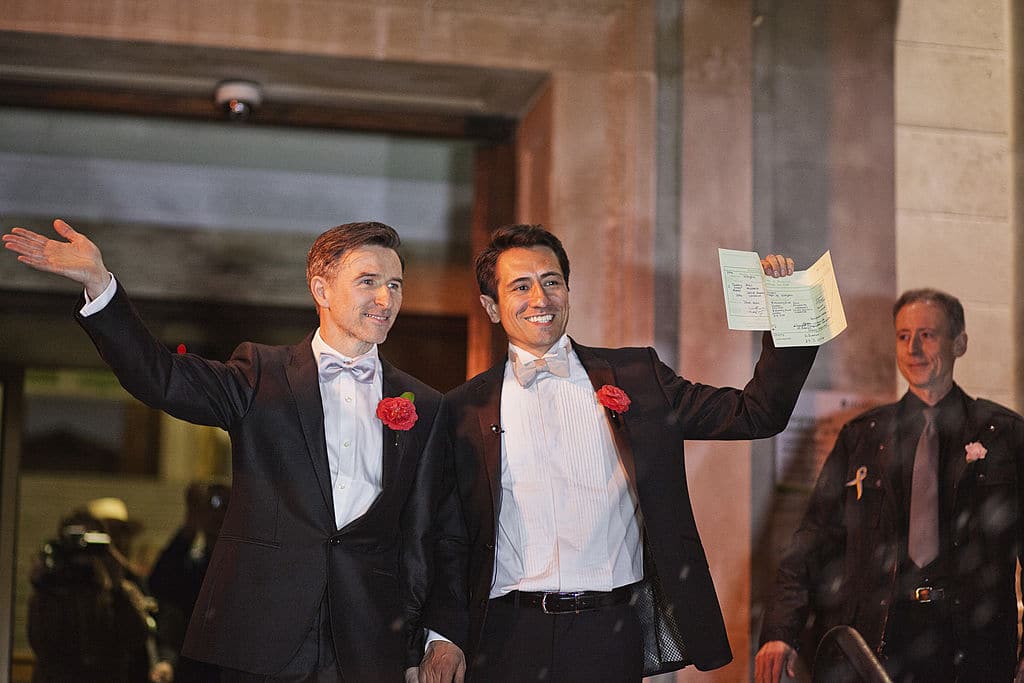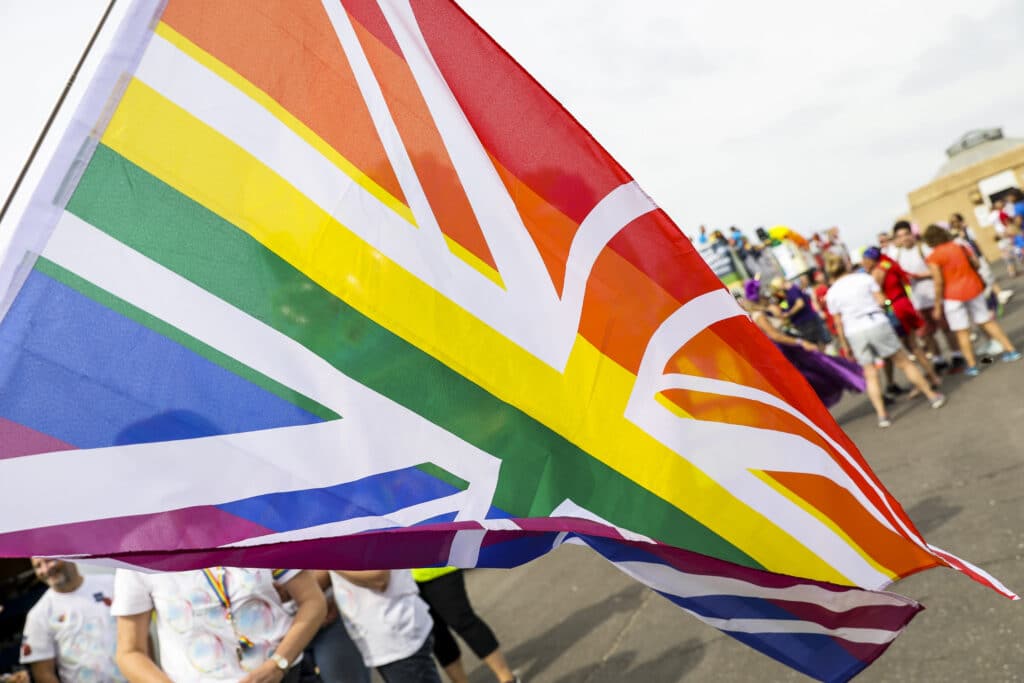The UK has made legal leaps and bounds when it comes to LGBT+ rights – but the fight is in no way over. (Tristan Fewings/Getty Images)
Karen Holden, LGBT+ lawyer and founder of A City Law Firm, writes for PinkNews about the legal leaps and bounds the UK has made in the last three decades.
It has been almost 54 years since the decriminalisation of homosexuality started, sparking the decades-long fight for LGBT+ equality under British law.
It all kicked off on 21 July 1967 with the Sexual Offences Act (the law that started to recognise LGBT+ rights). Since this monumental move, we have made some phenomenal steps forward.
In light of this upcoming anniversary, let’s celebrate some of the most game-changing laws that have transformed the lives of the community to date.
LGBT+ Brits have the right not to be discriminated
The 1998 Human Rights Act, one of the most important pieces of legislation in Britain, allowed for fundamental human rights – the right to be treated equally, with fairness, dignity and respect.
It, crucially, this includes the right not the be discriminated against for sexual orientation.
It was later used to also advance the rights of LGBT+ individuals for legal protection in a relationship.
Same-sex couples can legally adopt
Paving the way for queer couples to start a family, the Adoption and Children Act 2002 meant that for the first time same-sex couples were legally able to adopt.
This also allowed many the right to be considered not just as a person who helped care for their partner’s child but as their actual legal parent too.
The law that opened the door for civil partnerships
In what was a stepping stone towards marriage quality and a seismic leap in LGBT+ rights in Britain, the Civil Partnership Act 2004 marked a significant change in the legal standing for couples.
LGBT+ couples could now register as legal partners, share property and have the ability to apply to the family courts for a fair resolution on separation.
Trans people can legally change their gender for the first time

The 2004 Gender Recognition Act was the upshot of the European Court of Human Rights ruling in favour of trans woman Christine Goodwin, who was denied the right to marry in the UK.
It created for the first time a mechanism that allows trans people to be legally recognised by something other than their assigned gender at birth – this includes having the correct gender marker listed on their birth certificate.
For the first time, queer families could use surrogacy to start a family
Although surrogacy was permitted before, the parental order process, which makes the intended parent or parents the legal parents rather than the surrogate, was not available for same-sex male couples.
But the Human Fertilisation and Embryology Act 2008 rectified this and even introduced the ability for same-sex female couples to be both named on the birth certificate as the legal parents of a child after using a known donor.
A single act that ensured stronger protections for all LGBT+ people
The landmark Equality Act 2010 added gender reassignment as a ‘protected characteristic’ and offered a vital tool to fight and promote protection against LGBT+ harassment, unfavourable treatment and discrimination.
Caselaw continued to evolve after this focal act against discrimination, perceived sexual orientation and those diagnosed with HIV and AIDS.
It was a drastic move to bridge the gap of there being separate laws to instead promote genuine equality for the LGBT+ community and many other minority groups collectively.
After rocky journey, marriage equality finally becomes reality

The road to marriage equality in Britain was a years-long uphill climb for tireless activists but by 2013, the first same-sex couple to legally wed in England became a reality.
As well as equalising marriage in name, the Marriage (Same-Sex Couples) Act allowed same-sex couples to marry in both civil and religious ceremonies, where the religious organisation has ‘opted in’ to conduct such ceremonies and the minister of religion agrees.
Thousands of queer men pardoned in law named after Alan Turing

The “Alan Turing Law”, part of the Policing and Crime Act 2017, serves as an amnesty law pardoning criminal convictions of men who were cautioned or convicted under historical legislation that outlawed homosexual acts.
Named after Alan Turing, the cryptographer who helped to break the German Enigma code who had previously been convicted of ‘gross indecency’ and was chemically castrated, who was granted a royal pardon.
The association of British Insurers Guide to minimum standards 2018
HIV discrimination was removed from the previous wording included the association of British Insurers Guide to minimum standards in 2018 for being highly judgemental and stigmatising.
The new guidance from the trade association made up of hundreds of insurers reflects the considerable progress that has been made for those living with HIV over the last thirty years.
In 2019, single parents could apply for parental rights after surrogacy
An adaption to the law came into force making parental orders (which give parenthood to the intended parents after the birth and extinguish the status of the surrogate) available to single parents as well as to couples.
All these changes helped LGBT+ families really flourish, providing the right to alternative family structures, from marriage equality to adoption and surrogacy for same-sex couples being made more accessible; the protection against discrimination both in and outside the workplace, against neighbours or providers, altering the way they approach members of the LGBT+ community.
We can also look forward to further changes in the future as well, such as blood donation rules for gay and bisexual men being relaxed across the UK (changes should be implemented by July 2021).
Although we should celebrate how far LGBT+ rights have progressed there are still things left unaddressed and biases still restricting genuine equality.
Here are just some of the changes needed for greater equality:
- Surveys and soft supervision by the EU will be lost on LGBT+ laws and rights so the UK need to put in place its own protections to ensure we are continually moving in the right direction.
- Proposals to reform the Gender Recognition Act were effectively dropped, so transgender people still need a medical diagnosis to legally change gender. This is archaic and is unfair. It is our hope that these proposals for reform are brought back soon.
- Although LGBT+ education in schools was made mandatory there continues to be resistance from some parents and religious campaign groups. This means that how this education is to be implemented remains uncertain. Laws around this, to provide a framework for this contentious area would be welcome.
- Making surrogacy in the UK smoother with automatic parental rights.
We have come a very long way and things are slowly evolving, but there is still more to do and mindsets left to modify.
